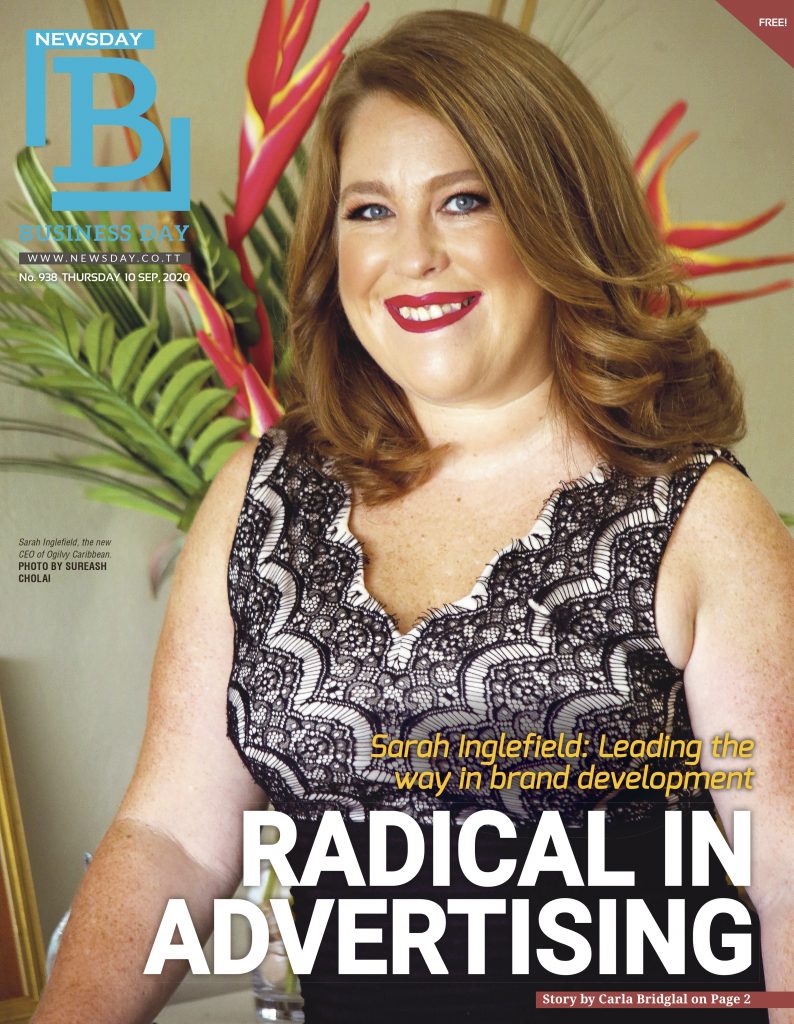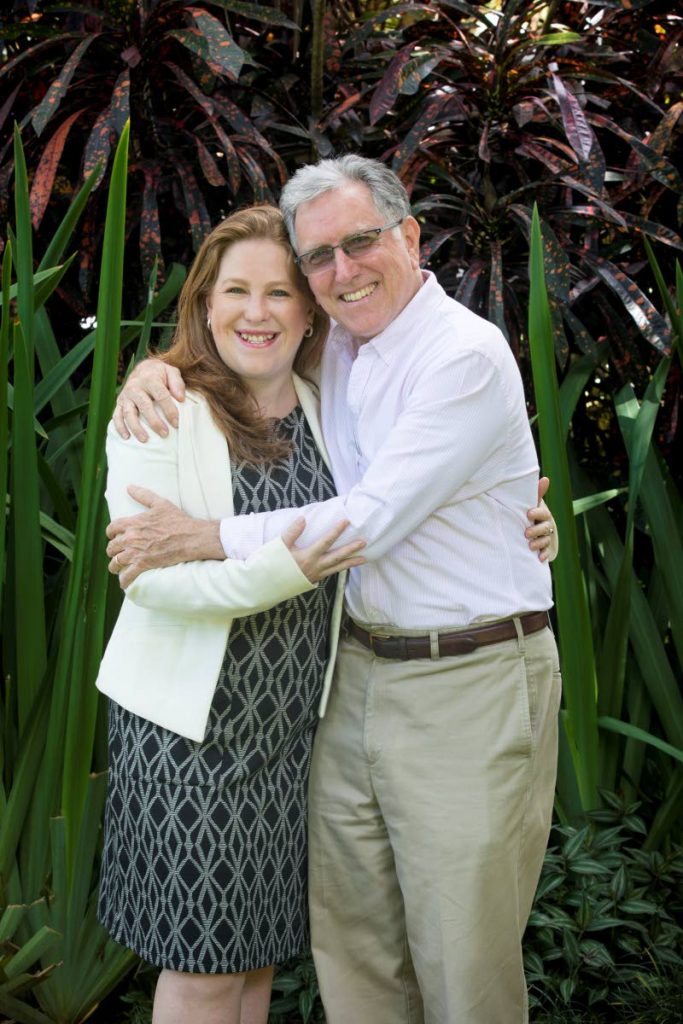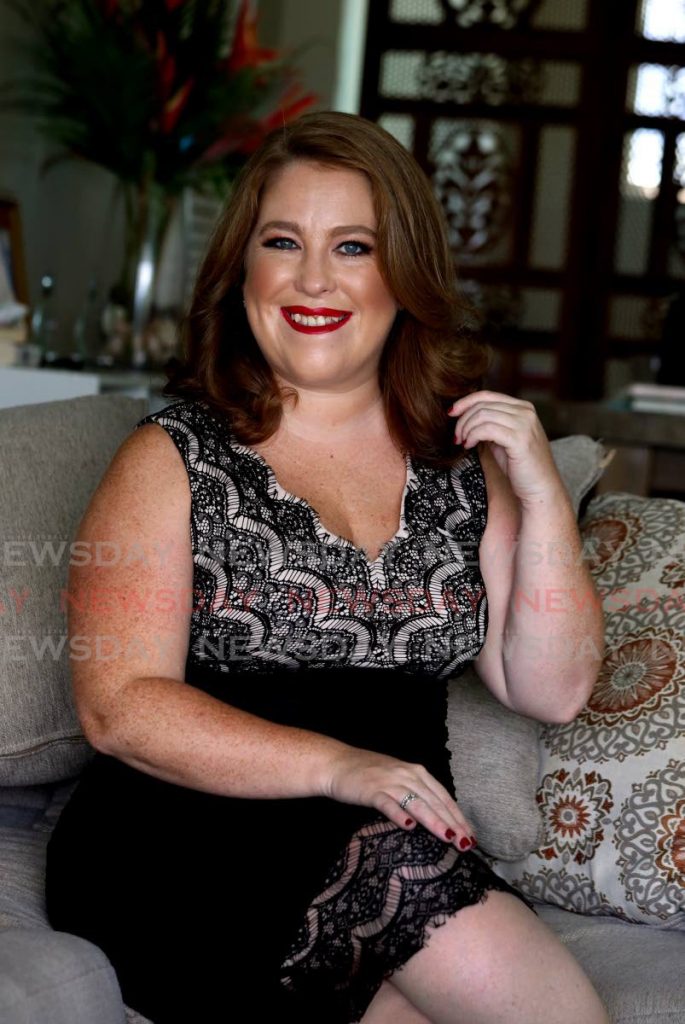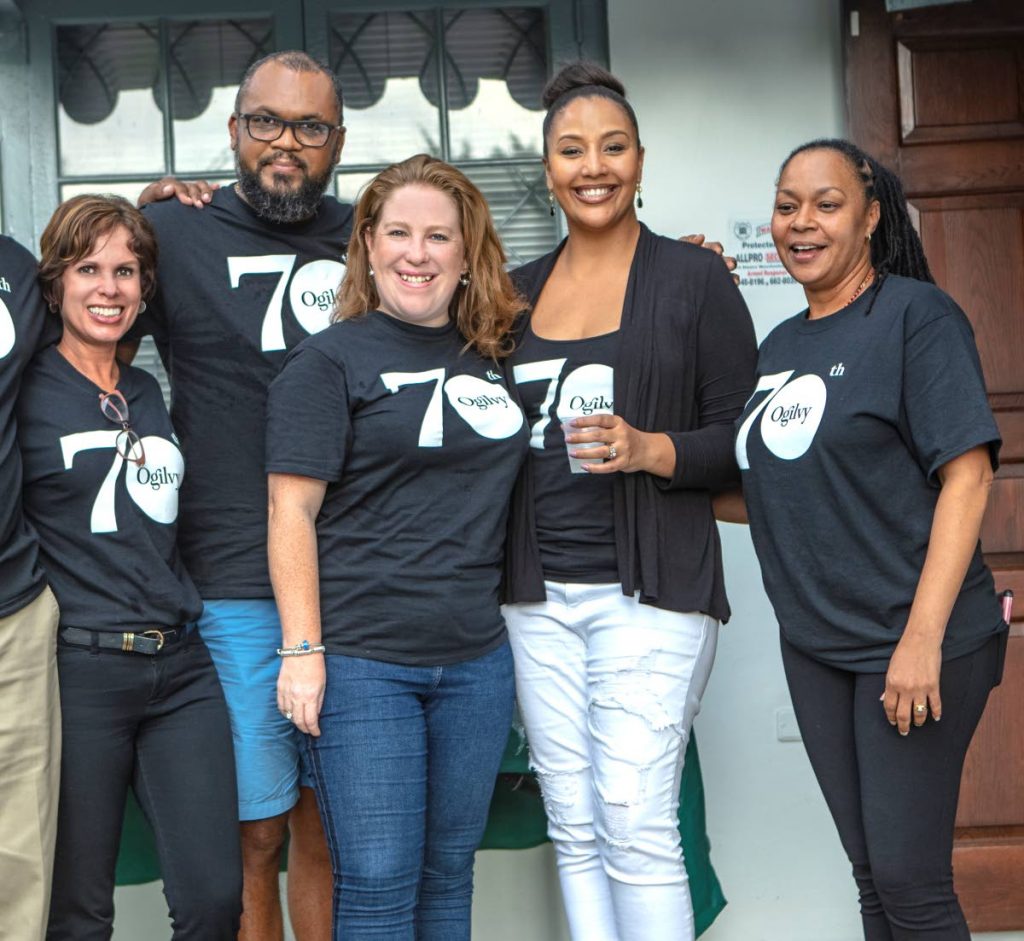Sarah Inglefield radicalising advertising

The first brand Sarah Inglefield fell in love with was Brand Trinidad and Tobago.
“I love my country. And so, I decided that was what I was going to do with the rest of my life: promote Trinidad and Tobago,” she recalled during a recent interview with Business Day.
So, as an idealistic youth she studied travel and tourism in Scotland with the intention of coming back home and transforming the industry. Except, when she graduated and tried to get a job, reality hit.
“I found that tourism wasn’t a priority so there were no jobs.”
But then fate – in the form of her uncle David Inglefield – intervened. Inglefield was the founder of Inglefield Ogilvy and Mather (IOM), one of the top advertising agencies in the country and the local arm of international advertising giant Ogilvy. He gave her a job “for a six-months until you could figure out your life,” she remembered him telling her. She took up his offer and met her true love, advertising. That six months turned into a whirlwind, globetrotting career. After five years working with some of the top local and regional brands, she got the opportunity to move to London at advertising giant Ogilvy’s hub office; from there, she moved to its offices in Seoul, South Korea and Hong Kong.

“And now 15 years later, I’m still here. It’s turned out to be a real passion for me. I’m absolutely passionate about brand communication and understand people. It’s the psychology of consumer mindsets, really analysing how economic and cultural factors are influencing the market. As much as it’s about being creative and innovative, for me, there’s something really interesting about understanding human behaviour,” she said.
Inglefield is now the new CEO of Ogilvy Caribbean, highlighting the company’s ties as part of the international Ogilvy network. And at 39, she’s the youngest head of a major advertising company in TT – and the only woman.
She takes over from her uncle, Anthony (David’s brother), who although retired from an executive position will develop the company’s consulting business.
“About five years ago, he called me up and asked me when I was coming home to take over the business. I wasn’t ready then, but two years ago, I felt a strong pull to come back.”
Her passion for TT was still there and she believed it was time to put her ten years of international experience to work, sharing that knowledge and expertise at home. The transition period from Anthony to her took about two years and, in July, she was officially named CEO.
Evolution of the ad agency
Much like Inglefield herself, Ogilvy Caribbean has that local charm but an international flair thanks to its connection as part of the Ogilvy group. It’s something she hopes to leverage in her new role.
The Ogilvy Caribbean hub is in Trinidad, but the company has 14 affiliate agencies throughout the English-speaking Caribbean that regularly check in with the main office. Inglefield said her goal is to expand eventually within the region. But first, practical matters.
“When I first came back to Trinidad, you know I was coming with this first world frame of mind – fantastic techniques and operating models. And I quickly realised we are living in the dinosaur days, still ten years from where we ought to be.”
Her first task was creating what she called a radical transformation plan for the Caribbean, that reflected the fact that there was a transition in leadership happening with her moving to the CEO’s role, as well as an acknowledgement of changing markets and consumer mindsets. And this was even before covid19, she noted, which disrupted even more an industry already in flux.

“Traditional advertising is not dead. I would never say that. But it is losing its dominance in the minds of marketers. What people are really focused on is how to affect positive change in the mindset of consumers and that comes with strategies that (consider customer behaviour). The customer experience is no longer just about designing and selling a product.” Consumers now are demanding more from their interactions with brands, so whether its online or offline, there needs to be consistency in appearance and tone. Even advertising agencies needed to evolve their mission.
“It was very clear that we needed to radically transform. I don't want us calling ourselves an advertising agency anymore. I want us to call ourselves a brand development agency.”
Brand development, she said, starts much earlier than the previous strategy of coming up with a concept to market a product, where the ad agency is the last step in design and execution. Her plan considered seven pillars, of which advertising and media are just two elements of a much broader spectrum of capabilities, starting with business and brand consultancy. There’s also e-commerce (online shopping), an increasing trend internationally; and the role of the influencer and influencer marketing. Finally, there’s the concept of digital transformation.
“I'm so passionate about that. Everybody wants to talk about digital transformation but from what I’ve observed, across the entire spectrum of stakeholders, from even a governmental level, we are taking baby steps when we need to take radical steps to transform the way we operate as a country and as a society and the way we do business – and especially in terms of how we operate in terms of advertising, marketing and brand communications.”
Ogilvy Caribbean’s business, then, has evolved from advertising and media to a more comprehensive suite of services that builds a brand from idea to implementation.
“We're investing a lot into training and tools and resources. The greatest benefit is that, being part of the larger Ogilvy network means we can benefit from expertise that exists already.”
Industry in flux
Advertising and media as an industry has been having a tough time of it in the last few years. The internet – and internet marketing dominated by tech companies like Facebook and Google – has drastically changed the traditional revenue model for advertisers and traditional media outlets. Then, in 2020, came the covid19 pandemic, and in the first half of the year, advertising companies reported sales slashed by more than 50 per cent.
Inglefield, then, signed to be CEO in a moment of reckoning for the sector. But, she said, she thrives on the challenge.
“It's a very difficult time where we're operating in an environment where revenues have dropped in 2020, you know by mid-year 2020 we're about 50 to 70 per cent down, versus last year because of massive budget cuts (because of the impact of covid19 restrictions).
“We have our work cut out for us in terms of (attracting) new business being. As much as we want to look after our existing clients, (the economic impact) has reinforced the need for us to diversify our clients and look at new sectors. In tourism and agriculture, for example, we see massive opportunities,” she said.
She’s also been motivated personally; and serendipitously her transformation plan provided a clear outline on how Ogilvy Caribbean could operate amidst covid19 restrictions.
“The plan was developed over a year before covid19, and it’s only validated and accelerated (trends) we knew had to happen. That’s the reason we were able to adapt to our work-from-home policy two weeks before the Government announced the first lockdown and had 100 per cent of our staff working remotely… So far, it’s been working out well, with no impact on productivity. I would go as far as to say we see this as a model that can be something for us in the future.”
As a start, staff will continue to work from home for the rest of the year, she added.
Staying on brand
Another defining feature of 2020 so far is social justice movements, and how quickly a brand’s response can either endear or endanger it in public perception.
“I think the biggest factor that influences brand communications in 2020 and beyond is the human factor, because our consumers are now so sensitive. Obviously, they're in crisis. Everyone's in a crisis. And what happens is you become very sensitive (to perceived wrongs).”
She noted that some social movements, like Black Lives Matter, for example, has given people the confidence to speak out against injustices. And for brands, words matter.
This was the experience for three businesses – Starlite, Dianne's Tea Shop and Ramsaran's Dairy Products – which felt a public backlash to posts with racial overtones. In Ramsaran's case, an employee was fired and the company faced a short a boycott of its products.

“We (advertisers and brand managers) have to be hypersensitive and very aware of how the brand is perceived.”
Her advice is simple: know what you stand for and stay in your lane. If you're an edgy urban brand or one with a history of participating in social causes, perhaps you might be able to tap into social and cultural trends. If you’re not, avoid hitching to the bandwagon and stay out of it.
“People can sense when you’re not being authentic. Authenticity is the key to success in terms of brand communication because consumers are so alert. Brands need to understand who they are, what they stand for and their position in the market and (reflect that) in the way they communicate with consumers. The authenticity factor is absolutely critical in terms of effective communications.”
Inglefield is herself hyper-aware of the undertones of discrimination in the industry and wants to use her position, especially as a woman in a traditionally male-dominated profession.
“It comes with a real sense of pride and I'm very aware of the responsibility.”
She believes the industry is finally become more diverse and at least at Ogilvy Caribbean, there’s an emphasis on diversity.
“We pride ourselves on diversity and equality. One of our global brand pillars is diversity – and that’s diversity in terms of race, gender, sexual preference and religion. We would never participate or allow our clients to participate in any communication that might be derogatory (or offensive) to anyone. We would reject it, and I intend to work closely with the Advertising Agencies Association (AAATT) to start having some of these conversations around diversity, around inclusion, around more effective and strategic communications.”
Expertise equals relevance
The ability to calm choppy social justice waters with effective communication, among other things, is why advertising agencies – or rather, brand development agencies – will remain relevant.
“We exist to make brands matter. It's not just about an ad. That’s our motto.”

The fact is, Inglefield said, all businesses are in crisis mitigation mode. And to business owners who have seen a massive drop in revenue or contemplate laying off staff, they don’t care about an ad, they want to know specifics like how this is going to increase revenue and sell products.
“That’s why understanding your brand’s strategy and position (should be part of) your business strategy.”
Strategic services, then, like competitive analysis, are becoming so critical, she said, not something a traditional agency might offer the way a consultant might. Going beyond the agency model then is a brand partner that needs to be quickly responsive to trends and client needs.
“That's exactly why the changing face of the industry (needs to be cognisant) of how demanding consumers are now and how price sensitive products can be and how challenging the market is. Yes, (there will always be) the advertising and media side of things, but it starts with the strategy.”


Comments
"Sarah Inglefield radicalising advertising"